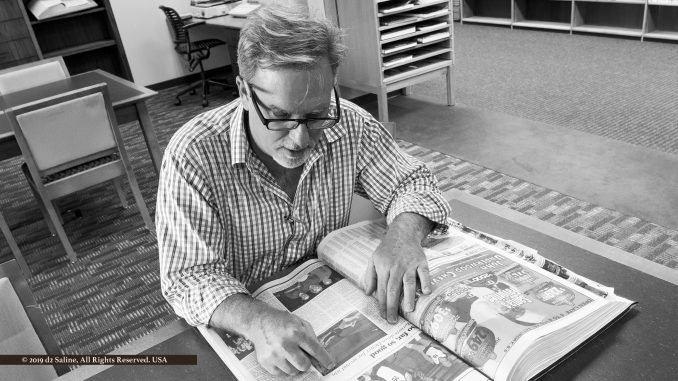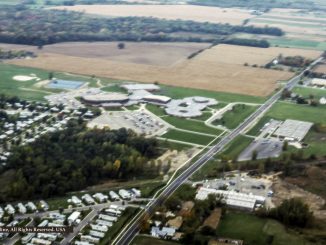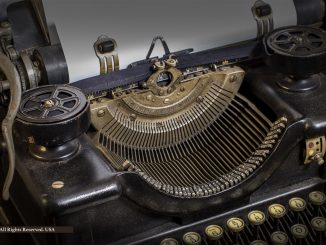
Our Ann Arbor / Ypsilanti Regional Chamber is set this week to tackle the challenge of remaining “informed and engaged” at a time after “The Loss of Local Media.” Saline Journal is set to cover the presentation, offered as part of their September “Early Edition” breakfast. [1,2]
Professional journalism and the press is an important subject of scrutiny on a broader stage today. But one of the best examples in advance of the upcoming Chamber breakfast comes from right here in town: The Saline Reporter. [3,4]
To better understand this, we sat down this past Saturday with one of its best former writers, Brian Cox. He started out as a freelancer in 2001 with Heritage Newspapers, which had acquired the then four-plus-decades old publication. A year later, he was hired on as staff, primarily covering I school sports and township news for The Saline Reporter and Milan-News Leader.
Saline Journal: “What was it like working for a traditional weekly newspaper with an honest-to-goodness print edition published every Thursday?”
Brian Cox: “I covered schools in both districts, city council in both cities at one point or another.
“I also wrote the police beat, features and a weekly opinion piece. Anything and everything. It was fantastic and I loved it. My editors, Tom Kirvan and then later Michelle Rogers, would occasionally assign stories, but they largely granted me autonomy. I took pride in being trusted to know my beats and the community.
“The weekly papers were published every Thursday. Deadline for stories was Wednesday morning, which always made election nights fun. When we started publishing to the web as well as a print edition, turnaround times became much quicker, obviously.
“I was expected to produce eight to ten stories a week, sometimes more. I might write three to four sports stories, a couple school board stories, a few city news stories, a feature, a police story, et cetera. Stories could range in length from 12- to 30-column inches or more, depending on the subject. A city council meeting or school board meeting could produce multiple stories. [5]
“I usually worked alone, often took my own photographs. For sports we had a terrific freelance photographer named Hiroshi Onuma, who took some great pics.
“I was pretty good about following AP style so the majority of my stuff was only lightly edited. I gave my editors pretty clean, compelling copy, I like to think. [6]
Saline Journal: “Describe ‘local media’ in terms of the larger environment here.”
Brian Cox: “Local media consisted of the town’s weekly paper and The Ann Arbor News.
“Heritage Newspapers published weekly papers in Saline, Milan, Chelsea, Manchester, Dexter and Ypsilanti; it also published the News-Herald and some other papers outside of Washtenaw County. When I began at The Reporter, local news online was nearly non-existent.
“It was frustrating at times competing with The Ann Arbor News because it was a daily and they were usually able to beat me to print. But there were several occasions when I scooped them big, and it was a real thrill. I loved beating them because it wasn’t easy. Once we began posting stories online, it became a little easier. [7]
“I remember I beat them to the story of the old Ford plant, which had become Automotive Components Holding, signing a memorandum of understanding with Johnson Controls to purchase the facility. The purchase didn’t ultimately materialize, but I remember I got news of the MoU on a Thursday morning and was ecstatic to post the story before anyone else. [8]
“It was a big deal because the plant was a significant tax source for the city and there were real economic consequences attached to the plant’s future.
“In the past, I would have had to wait an entire week until the print edition came out, at which point the news would have been stale.
Saline Journal: “What were some strengths of The Saline Reporter in the face of, say, The Detroit Free Press or even The Ann Arbor News?
Brian Cox: “The Detroit Free Press was never a worry. They were only concerned with stories that had some wider intrigue. I was never concerned that they would be able to present a fuller, more complete story than I could.
Another aspect of ‘local media’ that I found special is that I was known in the community. I wasn’t some ‘outside’ reporter blowing into town and then blowing out. People were certainly not always happy with me, but they knew where to find me. And I like to think that during my tenure at the paper, it was understood that I was always trying my best to present the community with the best and most accurate information possible in the most comprehensive context possible.”
Part 2 of our exclusive interview with Brian Cox on his work for The Saline Reporter will run tomorrow on Saline Journal. [10]
References
- Ann Arbor / Ypsilanti Regional Chamber (home page).
- “A2Y Chamber Event: Early Edition – The Loss of Local Media: How to Remain Informed and Engaged” (September 18, 2019) Ann Arbor / Ypsilanti Regional Chamber.
- “Book review: ‘Unfreedom of the Press’ sets stage for necessary discussion of integrity in journalism, ‘objective’ media” Dell Deaton (August 14, 2019) Saline Journal.
- “Saline Reporter” Central Michigan University: Digital Michigan Newspapers.
- “Jargon” New York News Publishers Association.
- AP Stylebook (home page).
- DNA of The Ann Arbor News is now part of the much larger mLive Media Group.
- The “old Ford plant” is now a Faurecia facility in Saline.
- Johnson Controls remained involved in elsewhere in Saline through ties to brownfield property remediation at 232 Monroe Street site.
- “Exclusive interview with Brian Cox, former journalist with ‘The Saline Reporter,’ on loss of local media: Part 2” Dell Deaton (September 16, 2019) Saline Journal.



